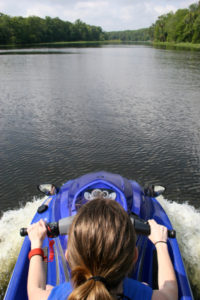Georgia Senate Bill 136 was signed into law on April 23, 2013. Part of the new Georgia Law, amended the law on personal watercrafts (jet ski, wave runner, etc.). One of the main amendments was regarding the age requirements, expectations, for operating a personal watercraft (PWC).
  View More Boating Safety Articles & Videos
Under Georgia Code Section 52-7-8.2 and 52-7-8.3 the exception to the general rule of being sixteen and over remains generally remains the same. However, the exceptions for younger PWC operator changed. If a child is between 12 and 15, they may legally operate a PWC only if:
1. The child has taken a boating education course, or
2. The child is on the PWC with someone 18 or older who is legally allowed to operate the PWC. The previous age exception of a responsible adult being ˜within 400 yards of the child on the PWC has been removed.
The changes to the Personal Watercraft Law were brought about after a child fatality that was attributed to a PWC operator without experience of knowledge of the PWC struck a child after operating too close to the child. The new PWC and Boater Education Law Kile Glover Boat Education Law was named in the child’s honor. The intent of the new PWC and Boater Education Law is to have reasonable restrictions on people operating a vessel on a public waterway via education and child protection.
Also, the new law makes it so that no one shall rent or lease a vessel with more than 10 horsepower to a person under 16. Additionally, effective July 1, 2014, any renter must have taken a Boating Education Course in order to rent or lease any vessel 10 horsepower or more, with certain limited exceptions.
Further, the Ëœaccompanying adult language regarding the need for not being under the influence adds language of under the influence of toxic vapors, which is reflective of Boating Under the Influence changes that are now more in-line with Georgia Driving Under the Influence laws.

Operator inexperience is one of the leading causes of personal watercraft accidents on Georgia Lakes.
The signed laws read as follows:
Said chapter is further amended by revising subsections (a), (c), (l), and (m) of Code Section 52-7-8.2, relating to restrictions on operation of personal watercraft, as follows: 107 “(a) As used in this Code section, the term:
(1) ‘Accompanied by’ means in the physical presence within the vessel of a person who is not under the influence of alcohol, toxic vapors, or drugs to a degree which would constitute a violation of Code Section 52-7-12 were such person operating the vessel.
(2) ‘Class A vessel’ means a boat less than 16 feet in length.
(3)(2) ‘Personal watercraft’ means a Class A vessel which:
(A) Has an outboard motor or which has an inboard motor which uses an internal combustion engine powering a water jet pump as its primary source of motive propulsion;
(B) Is designed with the concept that the operator and passenger ride on the outside surfaces of the such vessel as opposed to riding inside the such vessel; and
(C) Has the probability that the operator and passenger may, in the normal course of use, fall overboard.
Such term includes, without limitation, any vessel where the operator and passenger ride on the outside surfaces of the vessel, even if the primary source of motive propulsion is a propeller, and any vessels vessel commonly known as a ‘jet ski.’
(4) ‘Under the direct supervision’ means within sight of and within 400 yards of a person who is not under the influence of alcohol or drugs to a degree which would constitute a violation of Code Section 52-7-12 were such person operating the vessel and who is aware of his or her supervisory responsibility.”
“(c) No person shall rent, lease, or let for hire a personal watercraft to any person under the
age of 16 years Reserved.”
“(l) On and after June 1, 1995, no No person under the age of 16 years shall operate a personal watercraft on the waters of this state; provided, however, that a person age 12 through 15 years of age may operate a personal watercraft if he or she is accompanied by an adult age 18 years of age or over older or he or she has successfully completed a personal watercraft safety program boating education course approved by the department or is under direct supervision by an adult age 18 or over. The department may, but shall not be required to, conduct or provide personal watercraft safety boating education courses to the public.
(m) On and after July 1, 1995, it It shall be unlawful for any person to cause or knowingly permit such person’s child or ward who is less than 12 years of age or the child or ward of another over whom such person has a permanent or temporary responsibility of supervision if such child or ward is less than 12 years of age to operate a personal watercraft.”
Said chapter is further amended by revising Code Section 52-7-8.3, relating to operation of watercraft, as follows:
“52-7-8.3.
(a) A person age 16 years of age or over older may operate any vessel or personal watercraft on any of the waters of this state if such person has met the applicable requirements of Code Section 52-7-22, and such person shall have has in such vessel proper identification.
(b) A person age 14 or 12 through 15 years of age may operate:
(1) A a personal watercraft or nonmotorized Class A vessel on any of the waters of this state in compliance with the provisions of this article; and if such person:
(2) Any other vessel if such person:
(A)(1) Is accompanied by an adult age 18 or over 18 years of age or older who is authorized to operate such vessel under the provisions of subsection (a) of this Code section; or
(B)(2) Has completed a safe boating education course approved by the department; or
(C) Is under direct supervision by an adult age 18 or over.
(c) A person age 12 or 13 may operate any Class A vessel utilizing mechanical means of propulsion not exceeding 30 horsepower, under the conditions set forth in subparagraphs
(b)(2)(A) through (b)(2)(C) of this Code section. Such person may operate a personal watercraft in compliance with Code Section 52-7-8.2, and such person may operate nonmotorized Class A vessels without restriction No person between 12 through 15 years of age may operate a Class 1, Class 2, or Class 3 vessel.
(d) No person under the age of 12 years shall operate any Class 1, 2, or 3 vessel or any personal watercraft on any of the waters of this state, and no such person shall operate any Class A vessel utilizing mechanical means of propulsion exceeding 30 horsepower. Such person may operate a Class A vessel, other than a personal watercraft, utilizing mechanical means of propulsion not exceeding 30 horsepower only where such person is accompanied by an adult age 18 years of age or over older who is authorized to operate such vessel under the provisions of subsection (a) of this Code section.
(e) No person having ownership or control of a vessel shall permit another person to operate such vessel in violation of this Code section.
(f) No person shall rent, lease, or let for hire any vessel ten horsepower or more to any person under 16 years of age. On and after July 1, 2014, a person 16 years of age or older may rent or lease any vessel ten horsepower or more if such person has completed a boating education course approved by the department. This subsection shall not apply to any person licensed by the United States Coast Guard as a master of a vessel or a nonresident who has in his or her possession proof that he or she has completed a National Association of State Boating Law Administrators approved boater education course or equivalency examination from another state.
(e)(g) As used in this Code section, the term:
(1) ‘Accompanied by’ means in the physical presence within the vessel of a person who is not under the influence of alcohol, toxic vapors, or drugs to a degree which would constitute a violation of Code Section 52-7-12 were such person operating the vessel.
(2) ‘Personal watercraft’ shall have the same meaning as set forth in Code Section 52-7-8.2.
(3) ‘Proper identification’ shall have the same meaning as in subsection (d) of Code Section 3-3-23, relating to furnishing of alcoholic beverages.
(3) ‘Under the direct supervision’ means within sight of and within 400 yards of a person who is not under the influence of alcohol or drugs to a degree which would constitute a violation of Code Section 52-7-12 were such person operating the vessel and who is aware of his or her supervisory responsibility.
(f) No person having ownership or control of a vessel shall permit another person to operate such vessel in violation of this Code section.”
The new Georgia Law is designed to help protect children from themselves and from injuring others due to inexperience while on a personal watercraft (PWC).
At A. Bishop Law, our Georgia Criminal Defense Attorney welcomes questions on Criminal Defense laws, Traffic Laws and Georgia DUI laws. Please Call or Email us with any questions.
About the attorney:  Anne Bishop is a Georgia Lawyer with A. Bishop Law in Gainesville, Georgia and handles various DUI / DWI, Marijuana Arrests and other Georgia Criminal Defense matters.  The law office of A. Bishop Law can assist clients throughout Georgia including: Hall County (Gainesville, Oakwood, Flowery Branch), Jackson County  (Jefferson, Braselton) White County (Helen, Cleveland), Lumpkin County (Dahlonega), Dawson County (Dawsonville), Habersham County (Demorest, Cornelia), and all of Northeast Georgia.
This article and/or video should not be considered nor relied upon as legal advice since it is only intended for general overview and informational purposes. Please consult with an attorney on your specific situation in order to determine an appropriate legal course of action. 100cm sex doll





Pingback: New Georgia Boating Laws - Cushing Park | Cushing Park